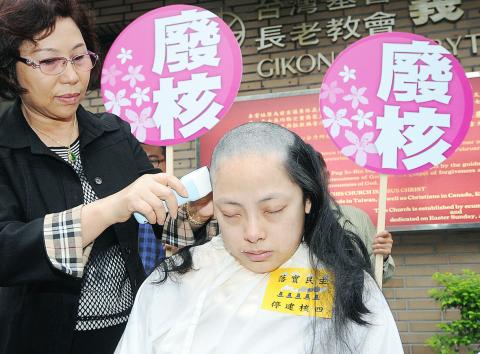As the indefinite hunger strike by former Democratic Progressive Party (DPP) chairman Lin I-hsiung (林義雄) enters its fourth day today, President Ma Ying-jeou (馬英九) is to meet with DPP Chairman Su Tseng-chang (蘇貞昌) to address Lin’s demands.
The 73-year-old Lin began his hunger strike on Tuesday demanding that the Ma administration respect the will of the people and halt construction of the Fourth Nuclear Power Plant in New Taipei City’s Gongliao District (貢寮).
Insisting that the decades-long issue should be put to a vote in a referendum in accordance with the Referendum Act (公民投票法), Ma has brushed off suggestions to resolve the crisis, including those proposed by several lawmakers from his own party, the Chinese Nationalist Party (KMT).

Photo: Fang Pin-chao, Taipei Times
The Referendum Act has been dubbed a “birdcage” law that is structurally flawed so that any referendum is doomed to fail, mainly because of its high thresholds.
Premier Jiang Yi-huah (江宜樺) met with KMT lawmakers at 5pm yesterday to ensure the lawmakers toe the party line, ahead of a meeting of the legislative plenary session today in which the DPP plans to table a statute that would allow a referendum on the plant to be decided by a simple majority vote.
After two-and-a-half hours of discussions, Jiang convinced some KMT lawmakers, who had earlier advised the government to respond positively to the demands made by Lin and the DPP to end Lin’s hunger strike, to change their positions.
The two conclusions reached at the meeting strictly followed what Ma and Jiang proposed.
First, the government will proceed with construction of the plant and ongoing safety checks and tests, but it will not install fuel rods and will not activate the plant until a referendum is held to decide whether it can be put into operation.
Second, all KMT lawmakers are required to attend the legislative meeting today to block the DPP’s plans to pass the special statute, or else they will face party discipline.
Earlier yesterday, KMT Legislator Lin Yu-fang (林郁方) told a group of reporters that he was against the idea of putting the issue to a referendum.
Lin said at the time that he would suggest that the legislature pass a resolution allowing the Executive Yuan to announce, without having to hold a referendum, that the construction of the plant will continue to completion and safety checks and tests will be performed, but the plant will not be activated.
KMT Legislator Lee Ching-hua (李慶華) had said that the Executive Yuan should announce a halt to the construction of the plant immediately after the legislature adopts a resolution to support its proposed plan to scrap the facility.
KMT lawmakers Alex Tsai (蔡正元), Su Ching-chuan (蘇清泉) and Chiang Hui-chen (江惠貞), among others, who had floated other proposals, did not force their ideas through at the meeting.

AIR SUPPORT: The Ministry of National Defense thanked the US for the delivery, adding that it was an indicator of the White House’s commitment to the Taiwan Relations Act Deputy Minister of National Defense Po Horng-huei (柏鴻輝) and Representative to the US Alexander Yui on Friday attended a delivery ceremony for the first of Taiwan’s long-awaited 66 F-16C/D Block 70 jets at a Lockheed Martin Corp factory in Greenville, South Carolina. “We are so proud to be the global home of the F-16 and to support Taiwan’s air defense capabilities,” US Representative William Timmons wrote on X, alongside a photograph of Taiwanese and US officials at the event. The F-16C/D Block 70 jets Taiwan ordered have the same capabilities as aircraft that had been upgraded to F-16Vs. The batch of Lockheed Martin

GRIDLOCK: The National Fire Agency’s Special Search and Rescue team is on standby to travel to the countries to help out with the rescue effort A powerful earthquake rocked Myanmar and neighboring Thailand yesterday, killing at least three people in Bangkok and burying dozens when a high-rise building under construction collapsed. Footage shared on social media from Myanmar’s second-largest city showed widespread destruction, raising fears that many were trapped under the rubble or killed. The magnitude 7.7 earthquake, with an epicenter near Mandalay in Myanmar, struck at midday and was followed by a strong magnitude 6.4 aftershock. The extent of death, injury and destruction — especially in Myanmar, which is embroiled in a civil war and where information is tightly controlled at the best of times —

Taiwan was ranked the fourth-safest country in the world with a score of 82.9, trailing only Andorra, the United Arab Emirates and Qatar in Numbeo’s Safety Index by Country report. Taiwan’s score improved by 0.1 points compared with last year’s mid-year report, which had Taiwan fourth with a score of 82.8. However, both scores were lower than in last year’s first review, when Taiwan scored 83.3, and are a long way from when Taiwan was named the second-safest country in the world in 2021, scoring 84.8. Taiwan ranked higher than Singapore in ninth with a score of 77.4 and Japan in 10th with

China's military today said it began joint army, navy and rocket force exercises around Taiwan to "serve as a stern warning and powerful deterrent against Taiwanese independence," calling President William Lai (賴清德) a "parasite." The exercises come after Lai called Beijing a "foreign hostile force" last month. More than 10 Chinese military ships approached close to Taiwan's 24 nautical mile (44.4km) contiguous zone this morning and Taiwan sent its own warships to respond, two senior Taiwanese officials said. Taiwan has not yet detected any live fire by the Chinese military so far, one of the officials said. The drills took place after US Secretary